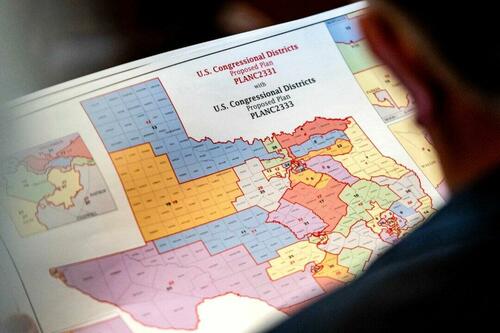Authored by Matthew Vadum via The Epoch Times (emphasis ours),
A federal judge who was outvoted in a judicial panel’s decision to strike down a redrawn election map in Texas issued a blistering 104-page dissent on Nov. 19.

Judge Jerry E. Smith of the U.S. Court of Appeals for the Fifth Circuit, who was appointed to a three-judge U.S. District Court panel hearing the case, said the 2–1 majority opinion of Nov. 18 invalidating the map was the “most blatant exercise of judicial activism that I have ever witnessed.”
The majority opinion “has dramatic political consequences by meddling in the orderly processes of a duly-elected state government,” he said.
“The main winners from Judge [Jeffrey V.] Brown’s opinion are George Soros and Gavin Newsom. The obvious losers are the People of Texas and the Rule of Law,” Smith said.
Soros is a high-profile financier and billionaire philanthropist known for heavily funding Democratic Party candidates and progressive nonprofits. Newsom, a Democrat, is the governor of California, who recently championed Proposition 50, a statewide redistricting referendum approved by voters on Nov. 4 that was designed to reduce Republican representation in his state’s congressional delegation. Newsom said the referendum was called to counteract the Texas redistricting that favors Republicans. The U.S. Department of Justice (DOJ) is suing to block the California redistricting plan.
U.S. District Judge Jeffrey V. Brown wrote the majority opinion in League of United Latin American Citizens v. Abbott. U.S. District Judge David C. Guaderrama joined it.
Brown said the state may not use the new map because “substantial evidence shows that Texas racially gerrymandered the 2025 Map.”
Gerrymandering refers to the manipulation of electoral district boundaries to benefit a particular party or constituency. The Supreme Court has previously ruled that race-based gerrymandering violates the U.S. Constitution, but redrawing boundaries to boost partisan fortunes passes constitutional muster.
In the majority opinion, Brown said that earlier this year, President Donald Trump urged Texas to redraw its map for U.S. House of Representatives elections “to create five additional Republican seats.”
When the Trump administration characterized its request “as a demand to redistrict congressional seats based on their racial makeup, Texas lawmakers immediately jumped on board,” Brown said.
On July 7, Harmeet Dhillon, who heads the DOJ’s Civil Rights Division, sent a letter to Texas Gov. Greg Abbott and Texas Attorney General Ken Paxton “making the legally incorrect assertion that four congressional districts in Texas were ‘unconstitutional’ because they were ‘coalition districts’—majority-non-White districts in which no single racial group constituted a 50% majority,” Brown said.
The department said it would take legal action if the state didn’t immediately redraw these districts, which was “a threat based entirely on their racial makeup,” Brown said. “Any mention of majority-White Democrat districts—which DOJ presumably would have also targeted if its aims were partisan rather than racial—was conspicuously absent.”
Brown said that two days after the letter was sent, Abbott added redistricting to the agenda of the state Legislature’s special session, and in doing so “explicitly directed the Legislature to draw a new U.S. House map to resolve DOJ’s concerns.” This meant the governor “plainly and expressly disavowed any partisan objective and instead repeatedly stated that his goal was to eliminate coalition districts and create new majority-Hispanic districts,” he said.
Various senior lawmakers said the Legislature had acted “to achieve DOJ’s racial goal of eliminating coalition districts,” Brown added.
Smith said he was given inadequate time to respond to Brown’s 160-page opinion, which means the dissenting opinion is “far from a literary masterpiece.”
“If, however, there were a Nobel Prize for Fiction, Judge Brown’s opinion would be a prime candidate,” Smith said.
Not giving Smith enough time to prepare has the effect of “diminishing the impact of the dissent,” the judge said, because the majority could not address Smith’s concerns in its opinion. Because Smith was unable to assemble his dissent in time for the release of the majority opinion, it had to be listed separately in the court docket, making it less accessible to the public, the judge said.
Smith said the question at hand was whether Texas state lawmakers carried out a “mid-decade congressional redistricting to gain political advantage,” or “to slash the voting rights of persons of color.”
Because the “obvious reason” for the redistricting was “partisan gain,” Brown “commits grave error in concluding that the Texas Legislature is more bigoted than political,” Smith said.
Smith also suggested Brown acted hastily in issuing the injunction blocking the new map instead of waiting for the Supreme Court to rule in Louisiana v. Callais, a case in which Smith said the high court is poised to resolve the tension between the federal Voting Rights Act and racial-gerrymandering jurisprudence.
During oral argument in that case on Oct. 15, the justices seemed likely to limit the use of race-based districting concerning Louisiana’s congressional map.
Smith said Brown should have considered denying the injunction, “recognizing that a fundamental shift in voting-rights jurisprudence” will likely happen soon.
“It is reckless for this court to proceed with opining on the merits, which amounts to nothing more than a general guess as to whether existing voting-rights jurisprudence will survive Callais,” Smith said.
Because certain statute-mandated election deadlines for the 2026 cycle “kicked in in September 2025,” and candidates began filing for federal and state office on Nov. 8 of this year, the injunction “turns the Texas electoral and political landscape upside down,” Smith said.
Hours after the majority opinion was made public on Nov. 18, Texas Gov. Greg Abbott (R) said the claim that the map was discriminatory was “absurd and unsupported” by testimony, adding the state would appeal directly to the Supreme Court.
“The Legislature redrew our congressional maps to better reflect Texans’ conservative voting preferences–and for no other reason,” Abbott said.
Republicans currently enjoy a razor-thin majority over Democrats in the U.S. House. Republicans now hold 25 of the U.S. House seats in Texas. Democrats hold 12 seats. Congressional elections are scheduled for Nov. 3, 2026.
Loading recommendations...